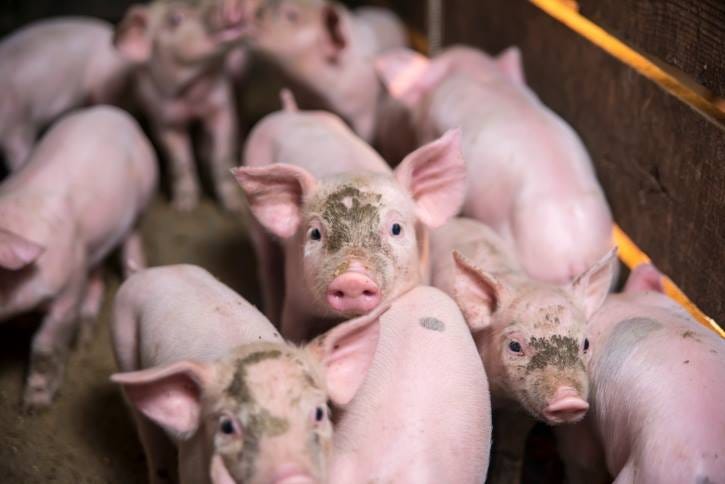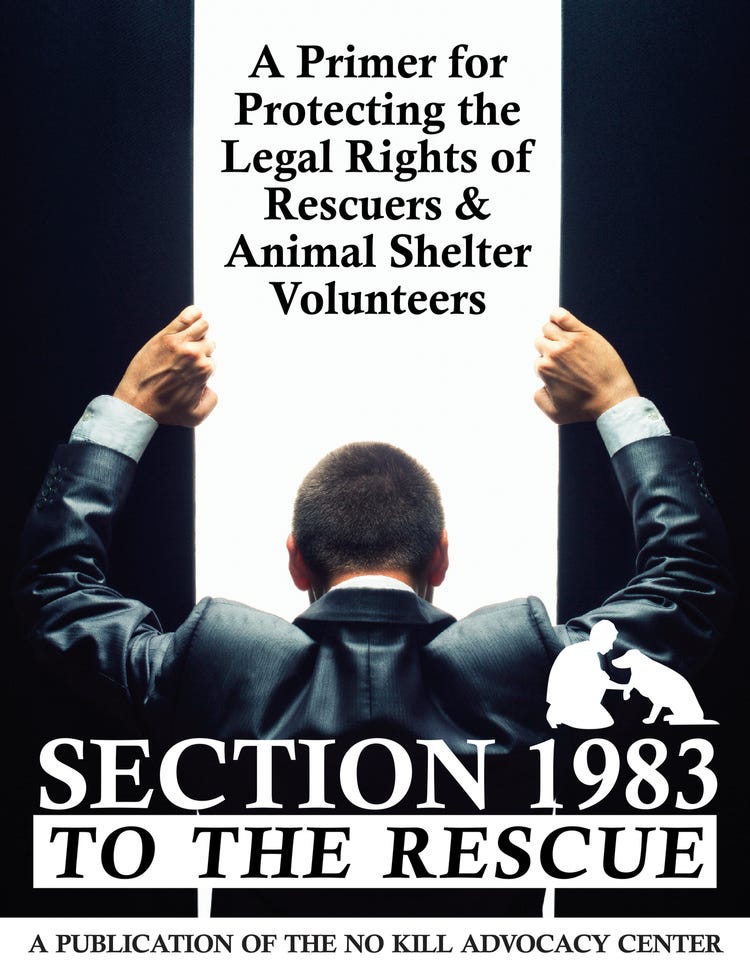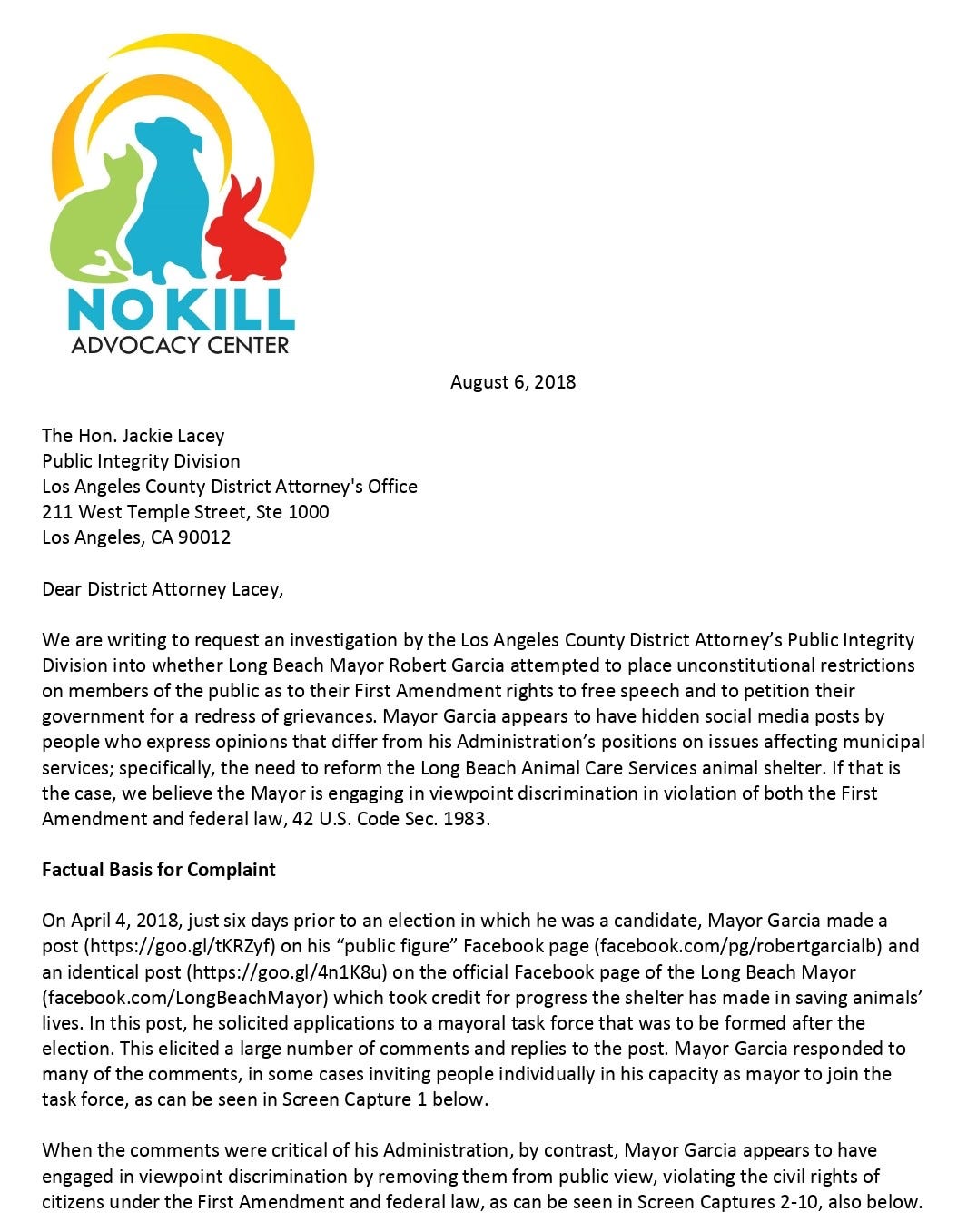The Most Powerful Tool in Animal Protection
The First Amendment gives advocates the protection they need to protect animals
In 2018, as Long Beach, CA, Mayor Robert Garcia was running for reelection, he knew his poor handling of the animal shelter would cost him votes. Just six days before the election, Mayor Garcia published a Facebook post misrepresenting the shelter’s performance, claiming “progress” under his Administration and announcing that he would form a mayoral task force to do even better if re-elected. In reality, the pound under his watch was a disgrace to the city and deadly to animals. In the comments, many of his constituents let him know.
Instead of justifying his (false) claims or responding to his constituents, Mayor Gracia hid the comments. Hiding Facebook comments is worse than deleting them because the person whose comment was hidden may not be aware they have been censored (and, therefore, may not know to seek redress). The post is only visible to the commenter. It is not visible to the press or the public, exactly what the Mayor intended.
Mayor Garcia’s hiding of comments critical of his failure to protect animals in the local pound was an unethical attempt to eliminate any negative impact on his bid for re-election. It was also an attempt at voter suppression. At the least, it suppressed the voters’ right to be informed about a candidate. But, more importantly, it was illegal, a violation of Federal law.
Citizens not only have a First Amendment right to speak out against government policies with which they disagree, but they also have a constitutionally protected right to demand that the government correct the identified wrongs. In Davison vs. Randall and Knight First Amendment Institute v. Trump, the Courts ruled that public officials cannot censor comments or block individuals on social media pages for criticizing them or their policies. Specifically,
The First Amendment does not permit a public official who uses a social media account for all manner of official purposes to exclude persons from otherwise-open online dialogue because they expressed views with which the official disagrees.
And in Robinson vs. Hunt County, the Court of Appeal further ruled that government officials cannot delete comments or ban the commenters because in criticizing officials or their policies, the commenter used language those government actors considered insulting, offensive, or inappropriate:
Official censorship based on a state actor’s subjective judgment that the content of protected speech is offensive or inappropriate is viewpoint discrimination.
As the U.S. Supreme Court has consistently ruled, “speech on public issues occupies the ‘highest rung of the hierarchy of First Amendment values’ and is entitled to special protection.” Connick v. Myers, 461 U.S. 138, 145 (1983). Indeed, such speech lies “at the heart of the First Amendment’s protection.” First Nat’l Bank of Bos. v. Bellotti, 435 U.S. 765, 776 (1978).
When animal lives are at stake — as they are when animals enter a shelter that has not fully embraced a culture of lifesaving — removing comments critical of policies that favor killing by government shelters is even more egregious given the life and death consequences.
Thankfully, the First Amendment gives rescuers, volunteers, and No Kill advocates the right to criticize the shelter online without being banned. It gives them the right to complain to city and county officials without being fired as a volunteer or rescuer partner. It gives them the right to take and publicize photographs of conditions at the shelter without being evicted from the premises. It forbids shelters from forcing them to sign, as a condition of volunteering or rescuing, a “non-disclosure” agreement that prevents them from posting criticism the shelter deems “disparaging.” And it makes it illegal to ban commenters, as well as hide or delete critical comments. Animal lovers do not surrender their constitutional rights at the shelter door.
The First Amendment is a powerful — perhaps the most powerful — tool in the fight to protect and save the lives of animals, not just in pounds but everywhere. For example, Federal Courts have ruled that state laws making it illegal to film animal abuse on factory farms violate the First Amendment. They have ruled that making it illegal to conduct remote telehealth appointments that reduce costs and allow rescuers to get medication without in-person appointments violates the First Amendment. And in a victory for anyone who has spoken out on behalf of animals mistreated, abused, and killed, a court rejected PETA’s argument that, as an animal advocate, I was not entitled to the protection of the First Amendment when he exposed their killing of animals, including a family’s dog.
Regardless of whether it is a billion-dollar company that profits from the abuse and killing of animals for food, a pound director who finds killing easier than doing the work necessary to stop it, an organization like PETA that rounds up to kill animals, a veterinary medical association trying to undermine lifesaving to maximize profits, or elected officials engaging in conduct that undermines our humane values, animal advocates cannot be intimidated into silence. The stakes are too high. Animals have no voice and need others to speak for them. Silencing people silences the animals. The First Amendment gives concerned citizens the protection they need to protect animals.
To be an effective voice for animals, advocates must know their rights:
A volunteer, rescuer, or other animal lover cannot be banned from a government shelter simply because they criticized shelter management, complained about the policies and practices of the shelter, or posted information that officials believe unflattering.
Does it apply in every state?
Yes. The First Amendment is a federal constitutional right, and 42 U.S.C. 1983, the applicable civil rights statute, is federal law. It applies in all 50 states.
Does it apply to private humane societies or SPCAs?
Because the First Amendment and related Federal law protect against government intrusion, it applies to private humane societies and SPCAs if they receive funding to provide a government function. Therefore, when those shelters have a contract to provide animal control services or sheltering, Sec. 1983 applies to private SPCAs. Allen vs. Pennsylvania Society for the Prevention of Cruelty to Animals, 488 F.Supp.2nd 450 (MD Penn 2007); Brunette vs. Humane Society of Ventura County, 294 F.3d 1205 (9th Cir. 2002); and Snead vs. Society for the Prevention of Cruelty to Animals, 929 A.2d 1169 (Pa.Sup.Ct. 2007).
Does that include the right to take photographs and videos in the shelter?
Yes. Volunteers, rescuers, and members of the public have a right to document things they believe are improper. They can also take photographs and videotape to assist in finding homes for animals. Animal Legal Defense Fund vs. Otter, 2014 WL 4388158*10 (D. Idaho 2014). “Videotaping and capturing images of poor shelter conditions or neglected animals are indistinguishable from ‘commenting’ or ‘speaking out’ on such conditions.” As such, taking a photograph or video is “included with the First Amendment’s guarantee of speech and press rights as a corollary of the right to disseminate the resulting recording.” ACLU vs. Alvarez, 679 F.3d 583, 597 (7th Cir. 2012).
Coda: After the election, and in response to a filing of a complaint with the Los Angeles District Attorney’s Office by The No Kill Advocacy Center, Mayor Garcia was forced to unhide the comments.






Some shelters have Facebook pages that are “group” pages. You can request to join the page and permission may or may not be given. The moderators of the page can removed posts that are not in line with a set of rules. Often one of the rules is that you cannot post negative comments about staff, volunteers, polices, procedures and so on. These Facebook pages are often limited to volunteers, staff, fosters or other groups. Is limiting and removing posts on these “opt-in” pages legal or is posting here also protected under the law?
We just talked about this on No Kill in Motion. Part I jsut released, additional segments soon to be published. https://youtu.be/5HdhcbEFFyI